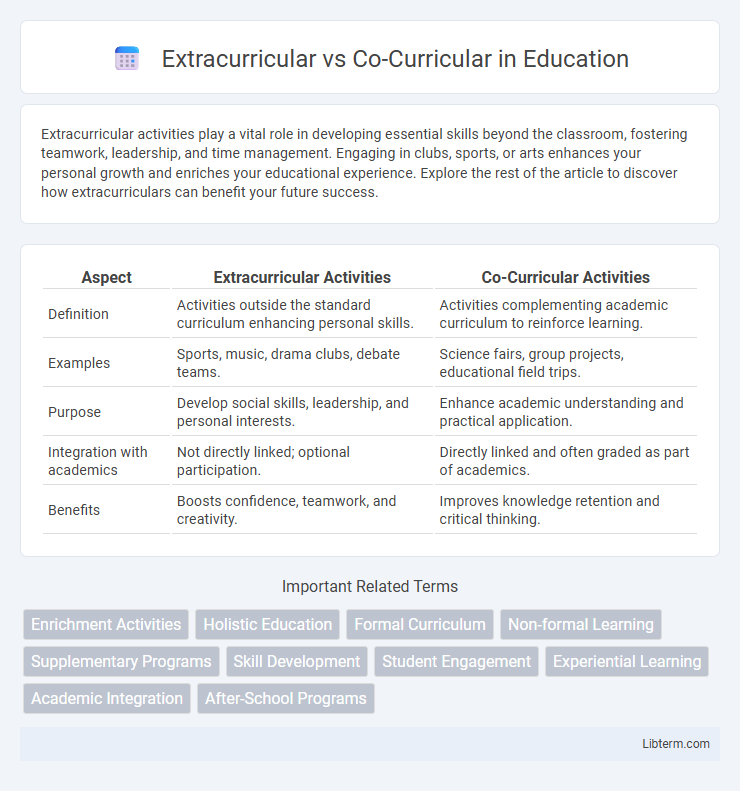Extracurricular activities play a vital role in developing essential skills beyond the classroom, fostering teamwork, leadership, and time management. Engaging in clubs, sports, or arts enhances your personal growth and enriches your educational experience. Explore the rest of the article to discover how extracurriculars can benefit your future success.
Table of Comparison
| Aspect | Extracurricular Activities | Co-Curricular Activities |
|---|---|---|
| Definition | Activities outside the standard curriculum enhancing personal skills. | Activities complementing academic curriculum to reinforce learning. |
| Examples | Sports, music, drama clubs, debate teams. | Science fairs, group projects, educational field trips. |
| Purpose | Develop social skills, leadership, and personal interests. | Enhance academic understanding and practical application. |
| Integration with academics | Not directly linked; optional participation. | Directly linked and often graded as part of academics. |
| Benefits | Boosts confidence, teamwork, and creativity. | Improves knowledge retention and critical thinking. |
Understanding Extracurricular and Co-Curricular Activities
Extracurricular activities are pursuits outside the standard curriculum, such as sports, drama, or clubs, that enhance personal interests and social skills. Co-curricular activities directly complement academic learning, including science fairs, debate teams, and group projects, fostering knowledge application and teamwork. Both types play vital roles in holistic student development by promoting different skill sets and engagement levels.
Key Differences Between Extracurricular and Co-Curricular Activities
Extracurricular activities occur outside the standard curriculum, including sports, clubs, and volunteer work, enhancing social skills and personal interests. Co-curricular activities complement academic learning by integrating practical experiences like debates, science fairs, and music performances directly related to coursework. The key difference lies in their alignment with education goals, where co-curricular activities support academic objectives, while extracurriculars foster broader personal development.
Benefits of Extracurricular Activities
Extracurricular activities enhance students' social skills, leadership abilities, and time management beyond the classroom environment, promoting holistic development. Participation in these activities increases self-confidence, encourages teamwork, and fosters creativity, contributing positively to mental and emotional well-being. Research shows that students involved in extracurriculars often achieve higher academic performance and improved college admission prospects.
Importance of Co-Curricular Activities in Education
Co-curricular activities are integral to education, enhancing academic learning by fostering critical thinking, teamwork, and leadership skills. These activities align closely with the curriculum, allowing students to apply theoretical knowledge in practical settings, improving overall comprehension and retention. Participation in co-curricular programs has been linked to higher academic achievement, increased student engagement, and the development of essential life skills beyond the classroom.
How Extracurricular Activities Enhance Personal Development
Extracurricular activities enhance personal development by fostering essential life skills such as teamwork, leadership, and time management outside the traditional classroom setting. Participation in sports, arts, clubs, and volunteer work promotes self-confidence, social interaction, and problem-solving abilities. These experiences contribute to well-rounded growth, preparing individuals for academic and professional success.
Role of Co-Curricular Activities in Academic Growth
Co-curricular activities actively complement academic curriculum by enhancing students' critical thinking, communication, and time management skills, which directly contribute to improved academic performance. Participation in activities such as debates, science clubs, and arts encourages experiential learning and fosters a deeper understanding of classroom concepts. These activities create well-rounded individuals by bridging theoretical knowledge with practical application, promoting holistic educational development.
Balancing Academics with Extracurricular and Co-Curricular Participation
Balancing academics with extracurricular and co-curricular participation enhances student development by fostering time management, discipline, and diverse skill acquisition. Integrating co-curricular activities closely related to academic curriculum reinforces conceptual understanding while extracurriculars promote creativity and social interaction. Effective balance improves academic performance and holistic growth, essential for well-rounded educational experiences.
Common Examples of Extracurricular vs Co-Curricular Activities
Common examples of extracurricular activities include sports teams, drama clubs, music bands, and student government, which generally occur outside regular academic hours and foster personal interests. Co-curricular activities consist of science fairs, debate competitions, internships, and field trips, designed to complement and enhance the academic curriculum. Both types of activities contribute to overall student development, with extracurriculars focusing on social and leadership skills, and co-curriculars emphasizing academic growth and practical application of knowledge.
Impact on College Admissions and Career Prospects
Extracurricular activities, such as sports, clubs, and volunteer work, demonstrate a student's leadership, teamwork, and time-management skills, significantly enhancing college admissions chances by showcasing a well-rounded personality. Co-curricular activities, including academic competitions, debate clubs, and science fairs, directly reinforce classroom learning and highlight intellectual interests, appealing to admissions committees seeking academic passion and commitment. Both types of activities positively influence career prospects by developing transferable skills and building a robust resume valued by employers in diverse fields.
Choosing the Right Activities for Holistic Development
Selecting the right activities for holistic development involves balancing extracurricular and co-curricular engagements that enhance both personal interests and academic growth. Extracurricular activities, such as sports or arts clubs, foster creativity, leadership, and social skills, while co-curricular activities like debate teams or science fairs reinforce classroom learning and critical thinking. Prioritizing a combination tailored to individual strengths and goals promotes well-rounded development, improving emotional intelligence, resilience, and academic performance.
Extracurricular Infographic

 libterm.com
libterm.com